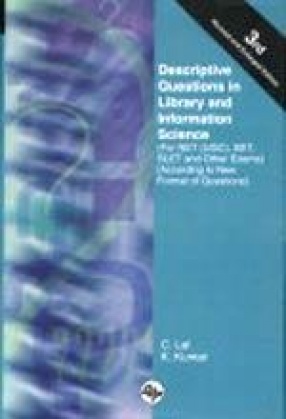
Ess Ess Publishers' Distributors

70 books
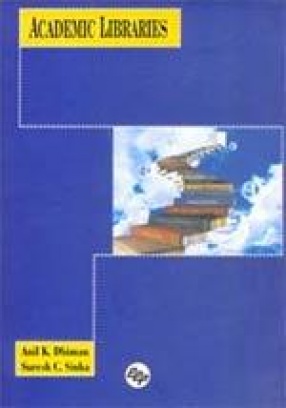
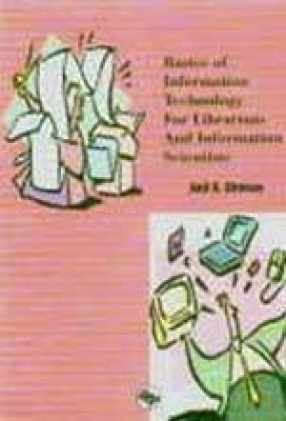

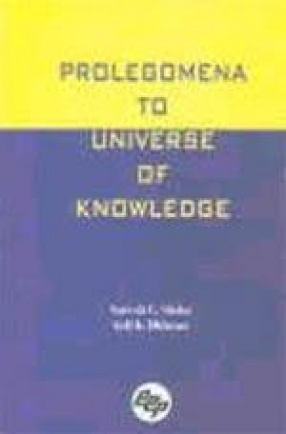

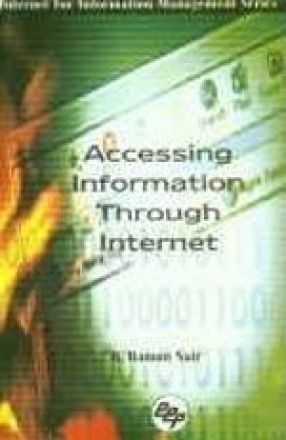

This is the revised and enlarged third edition of the book Descriptive Questions in Library and Information Science for Paper III written for NET (UGC) examination, according to the new format of questions prescribed by UGC in library and information science subject. In the present book, matter on each and every topic of the subject has been covered in detail so that the candidates appearing for the said test may have the entire matter in one place. For clear ...

It is very true that libraries play an important role in development of a society. Broadly speaking, there are three types of libraries. Viz., academic libraries, special libraries and public libraries. This book entitled ‘Academic Libraries’ gives an overview on each and every aspects of working environment of an academic library. The whole work is divided into 14 chapters which covers state of art of development of different types of academic libraries, ...

Though the field of Information Technology is ever-changing field and one work cannot be claimed as a complete work at a given time. But we may try to keep pace with them and certainly, there are some fundamental, which never changes. This book entitled ‘Basics of Information Technology for Librarians and Information Scientists’ is an attempt to provide basics of Information Technology to the working professionals in the library field. The book comprises of ...
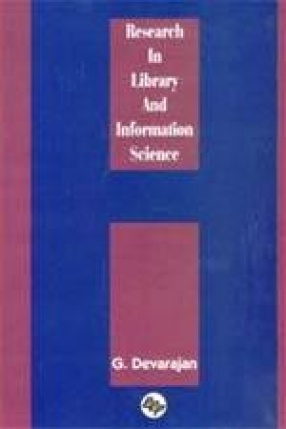
A compendium of selected research studies conducted in various Library Schools in Indian Universities. The subjects such as professional development, reading habits of women, space planning in libraries, industrial information system, I.T applications in decentralised planning and bibliometrics, scientometrics and webometrics studies focussed on various communication media are investigated. A reference manual for students, teachers and researchers engaged in ...
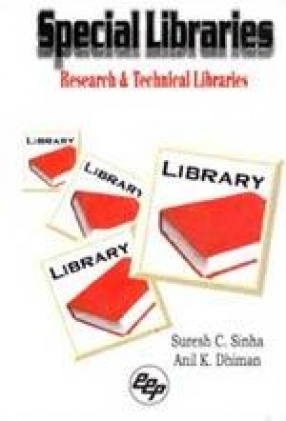
The present book on "Special Libraries: Research and Technical Libraries" is the fourth book in the series. This book fulfills the long felt need of those students who opt. paper on "special libraries" in MLIS degree of Indian Universities either as a regular student or through distant learning education. An attempt is made to cover all the aspects of special libraries as per the syllabi of these universities. The book has a chapter on ...
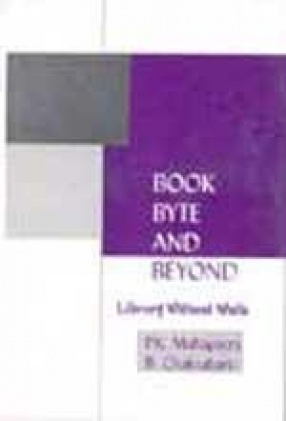
The goose quill put an end to talk. It abolished mystery. It was the basic metaphor with which the cycle of civilisation began, the step from the dark into the light of mind. The hand that hardened the clay tablets by baking like bricks created the library. Libraries have undergone a major change in modern times. They have been experiencing technological revolution that goes welt beyond anything that has existed since the invention of printing. Not surprisingly, ...

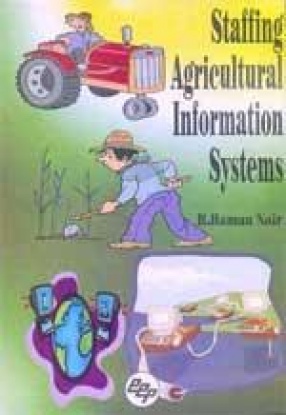
Staffing Agricultural Information systems focusses on the manpower strategies required for exploiting our agricultural knowledge resources. Public investment in agriculturl research runs into millions of rupees. Optimum utilization of the knowledge so generated, necessitates quick access to and speedy dissemication of the information generated by by research . The efficiency of more than 30,000 scientists working in thousands of institutions in our country's ...

Exploding the fanaticism of religions, the Sufis came with their message of love, accommodation and truth. Originating as a reaction against Islamic bigotry and persecution by the Arab Muslems, particularly the Abbasi Caliphs, they gradually spread all over the world. Unfortunately, some writers have been loath to recognize Sufism's broad mindedness and are inclined to squeeze into the narrow crevices of fanaticism and in the process to negate its effinity to ...
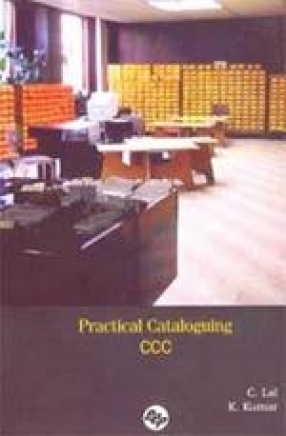
In the field of study and teaching of the subject library and information science, Cataloguing is recognised in two separate papers, i.e. theoretical cataloguing and practical cataloguing in the syllabii of B.Lib. Sc and M. Lib. Sc. courses in various universities in the country. In practical cataloguing, the practice of preparing entries on cards is done for constructing the catalogue of the libraries to satisfy various types of approaches of the users, for ...
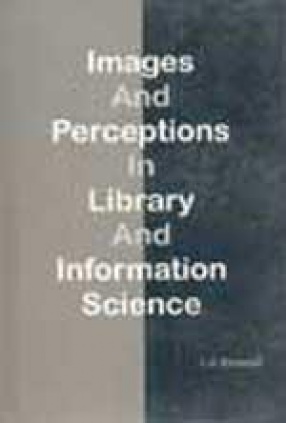
This book is a collection of articles written by the author over a period of time. The images and perceptions of the author emerged out of his experience in the LIS profession for the last three decades. He is one of the senior professional, with a wide experience of participating in a number of national and regional seminars. He has dealt with the problems which are real and specific in the public and academic libraries. The articles deal with a variety of ...

The present book on "Prolegomena to the Universe of Knowledge" is written keeping in view the difficulties generally students of MLIS face in the paper of the universe of knowledge and those who feel that the paper on the universe of knowledge is quite tough, hard and less securing in their examination conducted by various Indian universities either as a regular student or students persuing MLIS through correspondence/distance education. In the present ...
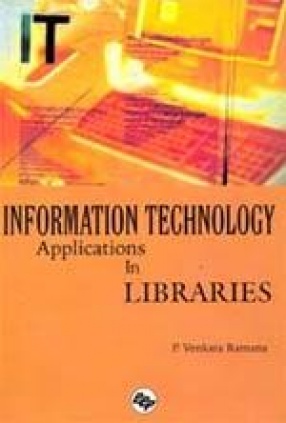
The impact of Information Technology (IT) is enormous and global in its magnitude. IT has become an integral part of all aspects of the library. IT has profoundly affected library operations, information resources, services, staff skills requirements and users expectations. IT has virtually unlimited potential for variety of useful applications in libraries as it significantly contributes to improved quality, increased productivity, more efficient operations, ...
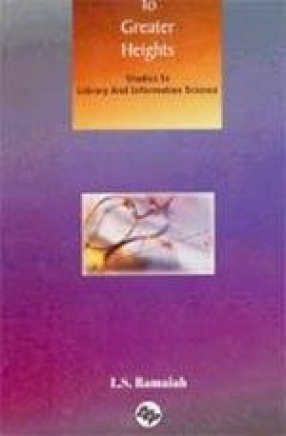
This book is a collection of articles written during a period of last few years. These are a mixed bunch providing the trends in the fields of public, academic and special libraries. In tune with the motto, ‘information to all’ that there should be ‘right to information to all’. Democratic governments have an obligation to see that information is provided to all with out any discrimination at all levels of society. Access to information should be ...

Library and information science profession has recognized the importance of the application of information technology as well as the need for developing new methods and techniques for the management of information in a technological environment. It is in this context a seminar on ‘Information access, management and exchange in the technological age’ was held at University of Calicut. This book, the outcome of the papers presented in this seminar, contains ...

The present book on ‘Research Methodology’ is a multi-purpose and multi-faceted book. It covers the syllabi of regular masters degree programmes of various Indian universities. This book will also be equally useful to the students those are pursuing their courses through correspondence of distance mode of education. This book covers all aspects of research methodology in the areas of social sciences, science and technology and library science. This book is ...
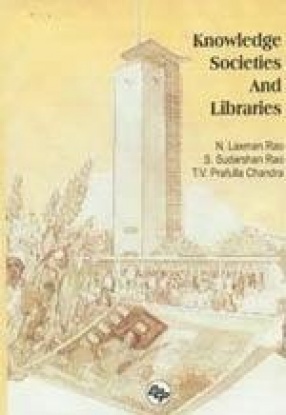
Knowledge Society is an Enlightened Society. To create knowledge society, there is a need to collect, preserve and provide access to World's information resources with the help of network of information resources or libraries, which promote world of ideas and creativity. The progress and sustainability of the nations is dependent on availability, access and adaptability of appropriate knowledge/information as a solution to the specific problems of the nations. ...

Internet is becoming the mechanism for distribution of three fourth of the specialized books and journals as well as research information. Immediate access to the research work of scientists and a virtual library of millions of documents afford students, teachers and researchers the ability to use huge amount of knowledge hitherto unthinkable. Now any one can make an endless thematic tour through information on libraries around the world. Internet provides ...
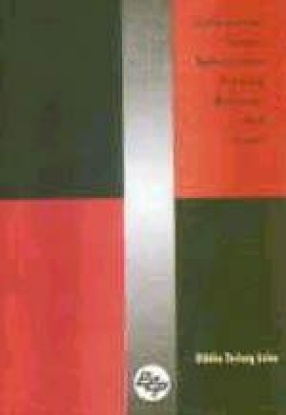
User studies are starting to be recognised as an important part of the information package. Information providers like the library need to be aware of their users’ information requirements as well as their information seeking and information retrieving methods in order that they might be able to provide better services. A lot of research has been done to find out the information needs and information seeking behavior of various categories of users of ...
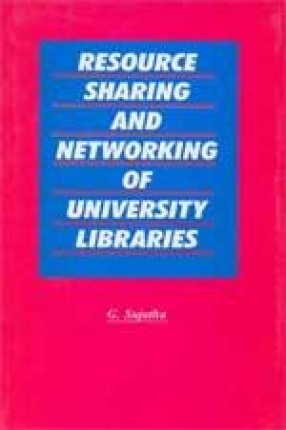
This book has seven chapters. They cover the development of University education, University libraries and different models of computer networks, the advantages and benefits of resource sharing among the University libraries. The book discusses about a local information grid to the Universities at a level which is essential for an effective working of the network such as the INFLIBNET at all India level. The book contains an abundant data and statistics which are ...


This book is intended for use in an applied introductory statistics course. As in this edition, the principles of both descriptive and inferential statistics are discussed and illustrated in situations that are close to most student's own experience. Students with a background limited to basic algebra will be able to complete the necessary mathematical calculations. The chapters in the text are organized according to several criteria, including the analytical ...

Internet for Library and Information Services is an introductory manual for the librarians and academicians who wish to tap the benefits of internet for providing information services or for retrieving documents and information required for research, teaching, learning or leisure. It leaves aside the technical aspects to the computer and communication technology expert and the digital library managers. Internet has become another alternative for library and ...
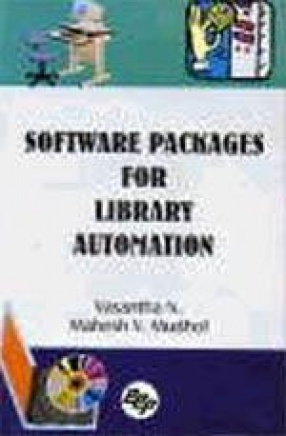
The book Software Packages for Library Automation is first of its kind in the field of Library and Information Science. Different software packages have been analysed in a systematic way and the book provides exhaustive bibliography. This book is useful for the library professionals and Library and Information Science students throughout India.
